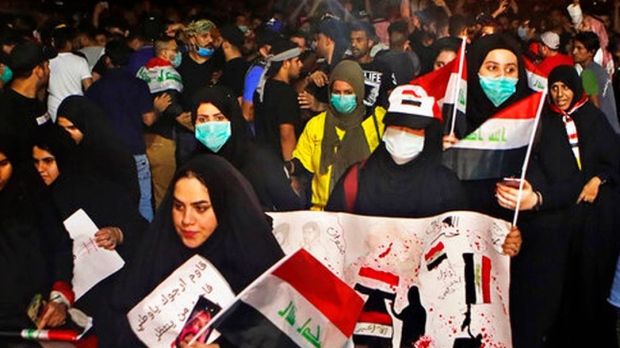BAGHDAD: Masked gunmen opened fire at Iraqi protesters in the Shiite holy city of Karbala on Tuesday, killing 18 people and wounding hundreds, security officials said, in one of the deadliest single attacks on protesters since anti-government demonstrations erupted earlier this month.
The attack, which happened overnight, came as Iraqis took to the streets for a fifth consecutive day, protesting their government’s corruption, lack of services and other grievances.
The bloodshed in Karbala, a major pilgrimage site where a revered Shiite figure was killed in a 7th century battle, could mark a turning point in the demonstrations.
It was not immediately clear who was behind the attack, and protesters said they did not know whether the masked men were riot police, special forces or Iran-linked militias.
The protesters said Iraqi soldiers had been stationed around the protest site but withdrew after the attackers began firing tear gas and live fire.
The provincial governor, Nassif al-Khutabi, denied that any protesters were killed but said there were some injuries among security forces.
He said videos that had spread online were fabricated and not from Karbala.
Footage circulating online purporting to show the aftermath of the attack showed fires and people running away to the backdrop of heavy gunfire.
The protests across Iraq, leaderless and largely spontaneous, have been met with bullets and tear gas by security forces from the first day.
At least 73 protesters not including the latest fatalities in Karbala have been killed since anti-government demonstrations resumed on Friday, after 149 were killed during an earlier wave of protests this month.
Tuesday’s attack happened in Karbala’s Education Square, where protesters had set up tents for their sit-in.
One of the demonstrators said they were chanting slogans when an army unit arrived, and that they gave the soldiers flowers and had friendly interactions with them.
Then tear gas canisters came spiralling into the square, fired from the streets and alleys behind the soldiers, who then withdrew.
“We saw masked men dressed all in black and they fired live bullets toward the square,” the protester said.
“People fell dead and wounded right next to me. We tried to escape but when we fled into the alleys we ran into moving checkpoints set up by these forces. They arrested people and searched their phones for video of what had happened.”
Another witness said hundreds of protesters were in the encampment when someone opened fire from a passing car.
Then, masked gunmen in black plainclothes arrived and started shooting at the protesters, and tents caught fire.
Both witnesses spoke on condition of anonymity, fearing reprisal. Iraqi security officials confirmed the death toll, speaking on condition of anonymity because they were not authorized to talk to reporters.
Karbala, along with Baghdad and cities across southern Iraq, has been gripped by a wave of anti-government protests which have often turned violent, with security forces opening fire and protesters torching government buildings and headquarters of Iran-backed militias.
The demonstrations have erupted in Shiite-majority areas and have been directed at the Shiite-dominated government and Shiite political parties and militias, many of which are supported by neighbouring Iran.
In Tehran, the Foreign Ministry warned Iranians over travelling to Iraq during the demonstrations and asked them to postpone their trips until further notice, according to the state-run IRNA news agency.
Karbala is one of the holiest places in Shiite Islam, where Hussein, the grandson of the Prophet Muhammad, was killed in battle in AD 680, a formative event in the schism between Shiite and Sunni Muslims.
Hundreds of thousands of Shiites flock to the city every year to commemorate his martyrdom.
The overwhelming majority of the residents in Karbala and the city’s security forces are Shiite.
The demonstrations are fuelled by anger at corruption, economic stagnation and poor public services.
Despite its vast oil wealth, Iraq suffers from high unemployment and crumbling infrastructure, with frequent power outages that force many to rely on private generators.
The protests have grown and demonstrators are now calling for sweeping changes, not just the government’s resignation. P Prime Minister Adel Abdel-Mahdi has promised a government reshuffle and a reform package, which the demonstrators have already rejected.
Authorities on Monday announced a curfew from midnight to 6 am in the capital, as renewed protests there and across the south raged.
A senior security official estimated that 25,000 protesters took part in the demonstration in the capital on Monday.
Thousands of students joined Iraq’s anti-government protests, as clashes with security forces firing tear gas canisters killed at least three demonstrators and wounded more than 100.
Students skipped classes at several universities and secondary schools in Baghdad and across southern Iraq on Monday to take part in the protests, despite the government ordering schools and universities to operate normally.
One of those killed was a 22-year-old female medical student, the first woman to be killed since the protests began earlier this month.
Seventeen students were among the wounded.(AGENCIES)


